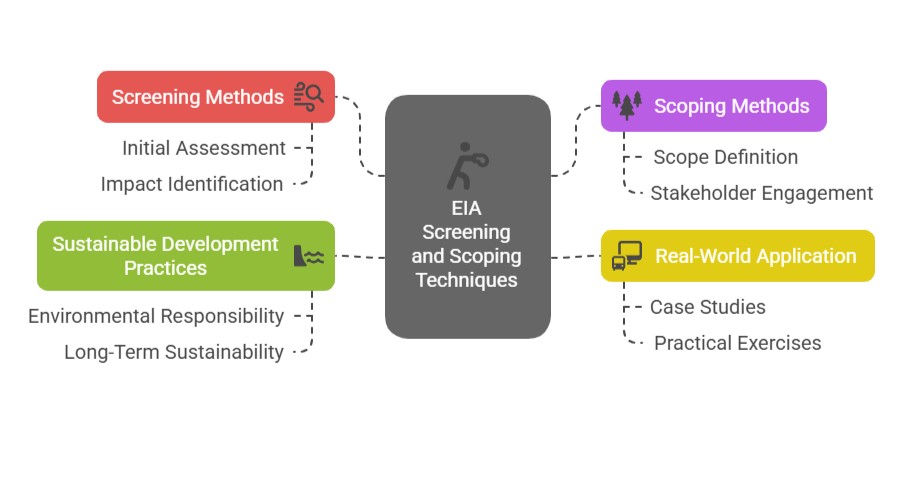
This comprehensive training course provides participants with a deep understanding of the fundamental principles and practical application of Environmental Impact Assessment (EIA), with a specific focus on the critical early stages of screening and scoping. Through a combination of theoretical knowledge and practical exercises, attendees will gain the skills necessary to determine if a project requires a full EIA and to define the precise scope of the assessment. The course is designed to empower environmental professionals to conduct these crucial phases effectively and in compliance with international best practices.
The course curriculum is structured to cover the entire EIA process, from initial project concept to the final decision. Key topics include understanding the legal and regulatory basis for EIA, applying screening criteria, and conducting a thorough scoping exercise. The training also delves into advanced techniques such as stakeholder mapping, baseline data collection, and methods for identifying and predicting environmental and social impacts. Throughout the training, participants will learn how to develop effective mitigation measures and create robust environmental management plans.
Who should attend the training
Objectives of the training
Personal benefits
Organizational benefits
Training methodology
Trainer Experience
Our trainers are seasoned professionals with over a decade of experience in conducting EIAs for a wide range of sectors. They have worked on multi-million dollar projects and are well-versed in both national and international environmental regulations. Their hands-on experience and deep subject matter expertise ensure that the training is not only informative but also highly relevant and practical.
Quality statement
We are committed to delivering high-quality, impactful training that meets the highest professional standards. Our courses are continuously updated to reflect the latest trends and best practices in the environmental sector.
Tailor-made courses
We offer customized training solutions tailored to the specific needs of your organization. Whether you require a focus on a particular industry, a specific country's regulations, or a combination of topics, we can design a program that addresses your unique requirements.
Course Duration: 5 days
Training fee: USD 1300
Module 1: Principles of Environmental Impact Assessment (EIA)
Module 2: EIA Screening Frameworks and Criteria
Module 3: The Scoping Process and its Importance
Module 4: Stakeholder Identification and Engagement
Module 5: Baseline Data Collection and Analysis
Module 6: Impact Identification and Prediction Techniques
Module 7: Mitigation Hierarchy and Monitoring Plans
Module 8: Developing an Environmental Management Plan (EMP)
Module 9: EIA Report Structure and Content
Module 10: EIA Review, Decision Making, and Public Disclosure
· Participants should be reasonably proficient in English.
· Applicants must live up to Armstrong Global Institute admission criteria.
Terms and Conditions
1. Discounts: Organizations sponsoring Four Participants will have the 5th attend Free
2. What is catered for by the Course Fees: Fees cater for all requirements for the training – Learning materials, Lunches, Teas, Snacks and Certification. All participants will additionally cater for their travel and accommodation expenses, visa application, insurance, and other personal expenses.
3. Certificate Awarded: Participants are awarded Certificates of Participation at the end of the training.
4. The program content shown here is for guidance purposes only. Our continuous course improvement process may lead to changes in topics and course structure.
5. Approval of Course: Our Programs are NITA Approved. Participating organizations can therefore claim reimbursement on fees paid in accordance with NITA Rules.
Booking for Training
Simply send an email to the Training Officer on training@armstrongglobalinstitute.com and we will send you a registration form. We advise you to book early to avoid missing a seat to this training.
Or call us on +254720272325 / +254725012095 / +254724452588
Payment Options
We provide 3 payment options, choose one for your convenience, and kindly make payments at least 5 days before the Training start date to reserve your seat:
1. Groups of 5 People and Above – Cheque Payments to: Armstrong Global Training & Development Center Limited should be paid in advance, 5 days to the training.
2. Invoice: We can send a bill directly to you or your company.
3. Deposit directly into Bank Account (Account details provided upon request)
Cancellation Policy
1. Payment for all courses includes a registration fee, which is non-refundable, and equals 15% of the total sum of the course fee.
2. Participants may cancel attendance 14 days or more prior to the training commencement date.
3. No refunds will be made 14 days or less before the training commencement date. However, participants who are unable to attend may opt to attend a similar training course at a later date or send a substitute participant provided the participation criteria have been met.
Tailor Made Courses
This training course can also be customized for your institution upon request for a minimum of 5 participants. You can have it conducted at our Training Centre or at a convenient location. For further inquiries, please contact us on Tel: +254720272325 / +254725012095 / +254724452588 or Email training@armstrongglobalinstitute.com
Accommodation and Airport Transfer
Accommodation and Airport Transfer is arranged upon request and at extra cost. For reservations contact the Training Officer on Email: training@armstrongglobalinstitute.com or on Tel: +254720272325 / +254725012095 / +254724452588
| Course Dates | Venue | Fees | Enroll |
|---|---|---|---|
| Jun 01 - Jun 05 2026 | Zoom | $1,300 |
|
| Aug 03 - Aug 07 2026 | Nairobi | $1,500 |
|

Armstrong Global Institute
Typically replies in minutes